Social Watch news
Published on Wed, 2013-06-26 08:40
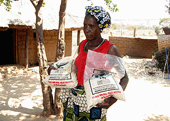
Empowering women. (Photo: WfC)
|
This report tracks the extent to which Zambia is making progress towards achieving the MDGs focuses on Goals 1 to 7 and assesses Zambia’s national development plans, the main tools for achieving economic and human development, particularly the Fifth National Development Plan (FNDP). It also analyses problems in the way the MDGs are formulated, arguing that unless these are taken care of, the human development conditions of countries such as Zambia will remain poor for a long time. Finally, it makes proposals for post 2015 reform.
At the launch of the MDGs in 2000, Zambia’s human development indicators were weak, owing to the steady deterioration of the economic and social conditions since the mid-1970s, when prices of its main produce copper fell on the world market. From the late 1980s and 1990s Zambia implemented the World Bank and the International Monetary Fund inspired Structural Adjustment Programme (SAP), under which significant cuts to public expenditure were applied, considerably weakening delivery of social services in the health, education and other sectors. This period is also when the HIV and AIDS pandemic hit Zambia the hardest.
|
Published on Tue, 2013-06-25 00:00
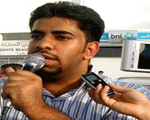
Mohammed Al-Maskati.
(Photo: BCHR)
|
The Gulf Center for Human Rights (GCHR) and Bahrain Center for Human Rights (BCHR) express their serious concern over ongoing campaign of judicial harassments against human rights defenders in Bahrain, that includes the very recent trial of defender Mohamed Al-Maskati on freedom of assembly related charges.
|
Published on Thu, 2013-06-20 09:08
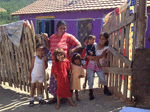
Family in Blazevo, Novi Pazar,
Serbia. (Photo: UNDP)
|
Serbia’s lack of any long-term vision or commitment as well as any comprehensive development strategies, make it difficult to counter the negative impact of the global economic crisis and establish a solid basis for economic growth, including increased jobs and livelihoods. In this context, with weak democratic institutions and lacking the rule of law, that the MDGs are unlikely to be achieved by 2015. There is thus a strong need to change the current neoliberal economic development paradigm to one that will focus on achieving human development for all.
The latest phase of the Serbian transition to a market economy, started in 2001, was not modelled with a clear vision of achieving economic prosperity and improved livelihoods for all, but focused on the livelihoods of those with economic and political power. Due to the high level of corruption, the lack of effective economic and social policy, and the absence of long-term vision and multisectoral strategies, Serbia cannot counter the consequences of the economic crisis and establish a solid basis for economic growth, one that can increase employment, salaries, livelihoods and quality of life.
|
Published on Thu, 2013-06-20 05:11
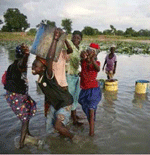
Women fetching water. (Photo:
African Agenda)
|
The July 2012 election of Nkosazana Dlamini-Zuma to the position of Chair of the African Union represented not only a milestone in the continental body's history, but it also an affirmation that African women occupying leadership positions had come a long way since the Organization of African Unity was established 50 years ago.
At the time of independence, despite being part and parcel of the different liberation struggles and being members of parliament, in a number of countries, and holding ministerial positions in countries like Ghana and Guinea, there was no similar effort to ensure women's voices were heard at continental level with the establishment of the OAU. And whereas voices such as Dr. Kwame Nkrumah of Ghana were posing questions such as “What part can the women of Africa and the women of African descent play in the struggle for African emancipation?”, the Charter of the OAU had no reference to women or the roles they could play, or how the institution could support their advancement or address focus on gender as well as actively ensuring issues of gender equality.
|
Published on Tue, 2013-06-18 21:43
The International Movement ATD Fourth World cordially invites you to the panel discussion titled Knowledge from experience: Building the Post-2015 Agenda with People living in Extreme Poverty.
This event is the conclusion to a two-day seminar giving people living in poverty and international development actors in the UN arena the opportunity to exchange ideas on an equal footing. The seminar forms part of ATD Fourth World’s participatory research conducted along-side its grassroots members.
The panel will consist of three sessions chaired by four ambassadors and will include keynote speeches from development stakeholders, academics and people living in poverty. ATD Fourth World will release the results of the participatory research and, participants will then discuss recommendations on the most effective means to deliver a sustainable development framework “that leaves no one behind”.
|
Published on Fri, 2013-06-14 00:00

Protest in Venezuela.
(Photo: PROVEA.)
|
The achievements in the fight against poverty that income statistics attribute to the government of Venezuela since 1999 are overshadowed by violence and insecurity that impede the full exercise of the rights to education, health, recreation and enjoyment of public spaces. Constitutional and legal reforms since 2008 represent another setback following the progress of basic rights in the first presidency of Hugo Chavez, by centralizing political power, restricting participation and democratic freedoms and pluralism, and increasing militarization of society. At the same time, the authorities insist on the criminalization of social protest and human rights.
The significant decline in poverty began during the administrations of President Chavez but stagnated in his second term (2007-2013). The reduction, which had been 16.4% between 2004 and 2006, was only 1.8% in the next four years.
|
Published on Thu, 2013-06-06 00:00
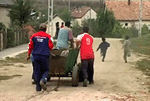
Roma in Hungary. (Photo: OHCHR).
|
In Hungary a system has developed that is disrespectful to both the rule of law and constitutionalism. Hungary has turned against the democratic ideals of the world, civil liberties are restricted and today it is on a declining economic path. Political life is characterized by a murderous policy divergence, confrontation and a dangerous ideology-based polarization. The majority of the society is struggling with unjust and unequal relationships without even the hope offered by mutual solidarity. Hungary's international prestige, integrity and credibility are now at its lowest point.
|
Published on Tue, 2013-06-04 21:04
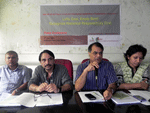
Speakers demanded debt
cancellation and democratic space
for LDCs. (Photo: SW Bangladesh).
|
[Dhaka, Tuesday, 4 June 2013] Civil society right groups network EquityBD and VOICE in a press conference held at the city’s national press club criticized United Nation High Level Panel (UN HLP) report on post 2015 agenda terming it “as lofty goal and empty bowl” and said that the report is in fact a far short in transforming economies. The UN HLP report has just published on 30th June 2013 in New York. The UN HLP was co chaired by UK Prime minister Davide Cameron, Indonesian President Dr. Susilo Bambang and Liberian President Alen Johnson Sirlef. Moderated by Rezaul Karim Chowdhury, chief coordinator of Equitybd, the position paper was read out by Ahmed Swapan Mahmud, executive director of Voice.
|
Published on Fri, 2013-05-31 13:44
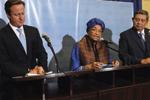
Panel co-chairs Yudhoyono,
Cameron and Sirleaf. (Photo: UN)
|
(Montevideo, 31 May 2013) Social Watch, a network of civil society organizations in over 80 countries that monitor their governments compliance with international commitments, expressed deep disappointment with the suggestions of new development goals to replace the MDGs proposed today to the United Nations by a High Level Panel.
The document is titled “A New Global Partnership” and the panel claims that, in preparing it, “we heard voices (...) from over 5000 civil society organizations working in about 120 countries” and “we also consulted the chief executive officers of 250 companies in 30 countries, with annual revenues exceeding $8 trillion”.
|
Published on Thu, 2013-05-30 13:12
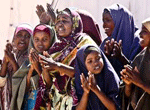
Gal-Mudug State, Somalia.
(Photo: IRIN)
|
Despite the vision of the Somali Reconstruction and Development Programme (RDP), a pro-poor instrument and support from the international community, Somalia is unlikely to meet most, if any, of the Millennium Development Goals (MDGs) by 2015. Almost 66% of the population is living in severe poverty. Together with the rest of Horn of Africa, Somalia is now recovering from the worst famine in 60 years, affecting over one-third of its population, armed conflict continues in many areas of the country and the international aid system is unable to meet basic needs: 3.8 million are still in need of emergency aid. With the election of a reform-minded president and speaker of parliament at the end of 2012, will the country be able to overcome these challenges and improve people’s livelihoods?
At a time when major breakthroughs were taking place in the field of development, including the release of first Human Development Report in 1990, Somalia was in its death throes. Moreover, the two decades of armed conflict that followed the state collapse in 1991 have taken a heavy toll on people, institutions, the economy and the environment.
|
SUSCRIBE TO OUR NEWSLETTER
Submit

|












